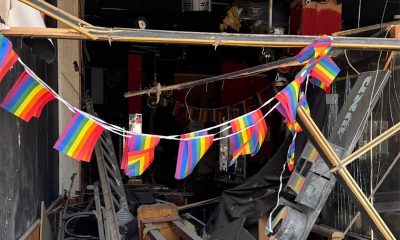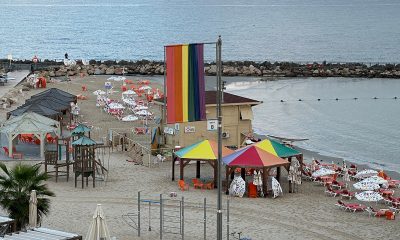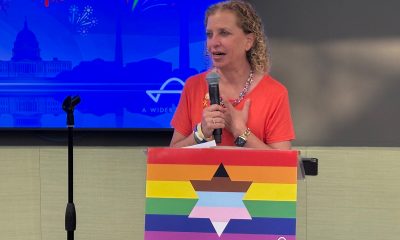Middle East
‘I don’t want a genocide to be done on queer people’s behalf’
LGBTQ Palestinians speak about Oct. 7, war in Gaza
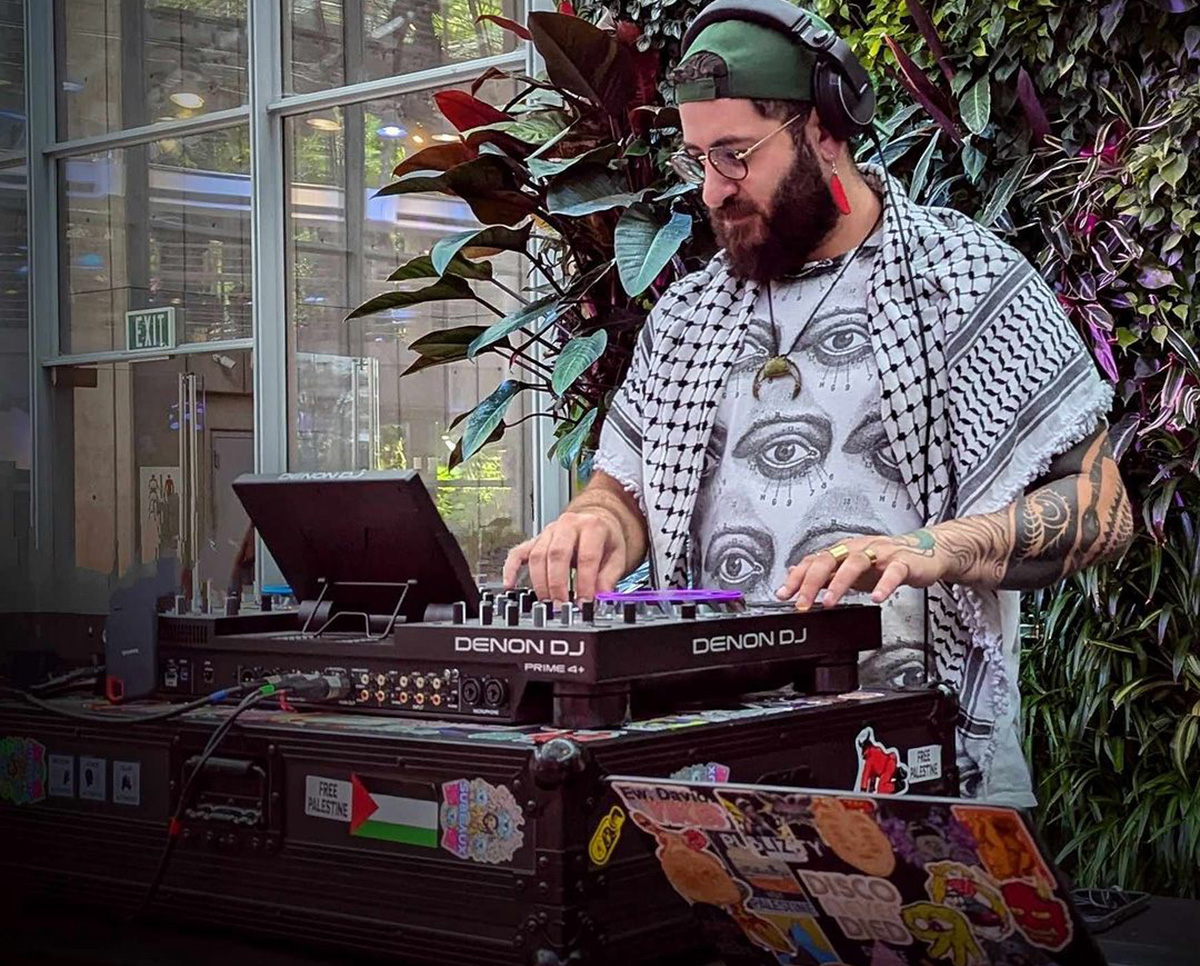
Editor’s note: International News Editor Michael K. Lavers will be on assignment in Israel through Oct. 9. Meta also removed this article from Lavers’s Facebook pages shortly after he published it.
Two LGBTQ Palestinians who spoke with the Washington Blade last week condemned Hamas’s surprise attack against southern Israel on Oct. 7, 2023. They also expressed condemnation of the subsequent war in the Gaza Strip, and the Israeli government’s policies towards the Palestinians.
Zaheer Subeaux is a queer Palestinian producer, DJ, emcee, and community organizer who lives in California. He is originally from Deir Dibwan, a small city on the West Bank that is a couple miles east of Ramallah, the Palestinian capital.
“For a lot of Palestinians who have family back home, this seemed like a proportionate response to an oppressed people,” he said. “For everyone else who’s not paying attention, who allow their tax dollars to continue fund this genocide, for them it’s like, oh, shocking, oh, wow, right out of the blue, because they’re not paying attention to what’s happening.”
“For the rest of us who actually are, this seemed like a completely reasonable thing for a people to feel during a time like this,” added Subeaux. “I don’t think a lot of people have the context for that.”
Hannah Moushabeck is a queer, second-generation Palestinian American who lives in Massachusetts.
Her family is from West Jerusalem. Moushabeck has relatives in Ramallah and in Beirut, the Lebanese capital, and has friends in Gaza with whom she has “been in daily communication.”
“My immediate reactions on Oct. 7 were obviously horror and fear of what’s to come and the violence that happened that day,” she told the Blade on Sept. 30 during a telephone interview.
Moushabeck said it is “not unusual for Palestinians in the diaspora to experience some of this violence happening in our homeland.”
“This is honestly something that’s been going on since well before I was born,” she said. “So, growing up, whenever my parents seemed upset or, Palestinians were being shown in the news, I knew it was likely because they were being killed or involved with some kind of intense violence.”
Moushabeck said “a lot of Palestinians kind of had an instinct to go through the motions when Oct. 7 happened.”
“We also recognized that it was really unprecedented, and that the reaction and the revenge that the Israeli government took out on Palestinians would be like nothing we’ve ever seen before,” she added.
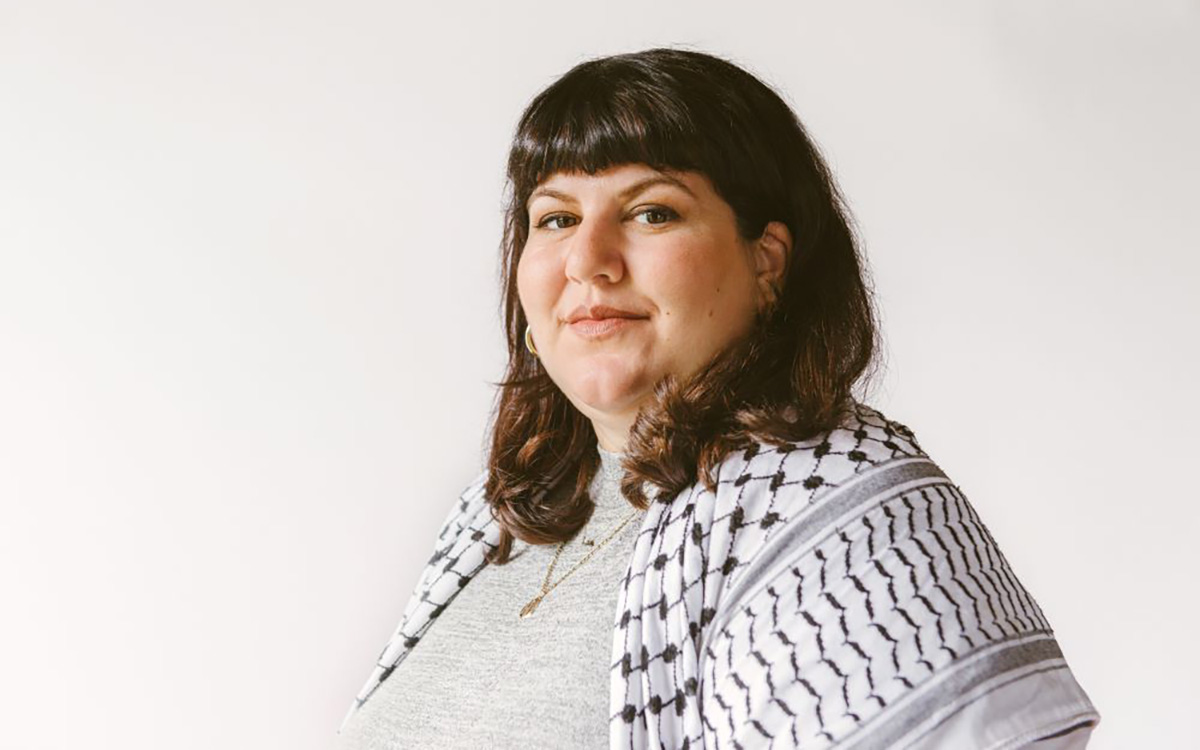
Monday marks a year since Oct. 7.
The Israeli government says militants on that day killed roughly 1,200 people, including upwards of 360 partygoers at the Nova Music Festival near Re’im, a kibbutz that is a couple miles from the Gaza border. The Israeli government says the militants also kidnapped more than 200 people on Oct. 7.
The Hamas-controlled Gaza Health Ministry says Israeli forces have killed more than 41,000 people in the enclave since Oct. 7.
Hamas, which the U.S. and Israel have designated a terrorist organization, claimed responsibility for an Oct. 1 attack at a Tel Aviv light rail station that left seven people dead and more than a dozen others injured. A Bedouin man on Sunday killed an Israel Border Police officer and injured 10 others when he attacked a bus station in Beersheva in southern Israel on Sunday.
Reuters on Friday reported the Lebanese Health Ministry said Israeli airstrikes in Beirut and elsewhere in the country over the last two weeks have killed more than 2,000 people. Iran last Tuesday launched upwards of 200 ballistic missiles at Israel in response to an Israeli airstrike in the Lebanese capital on Sept. 27 that killed Hassan Nasrallah, the long-time leader of Hezbollah, an Iran-backed militant group.
An Israeli airstrike in the West Bank city of Tulkarem on Oct. 3 killed 18 people in a Palestinian refugee camp.
The Israel Defense Forces and Shin Bet, the country’s security agency, said the airstrike killed Zahi Yaser Abd al-Razeq Oufi, a senior Hamas commander, and 11 other Hamas operatives. The Associated Press reported the airstrike also killed a family of four, including two young children.
The AP cites Palestinian officials who say an Israeli airstrike on a mosque in Deir al-Balah, a town in central Gaza, killed at least 19 people.
The International Criminal Court in May announced it plans to issue arrest warrants for Israeli Prime Minister Netanyahu, Israeli Defense Minister Yoav Gallant, and three Hamas leaders — Yehya Sinwar, Mohammed Deif, and Ismail Haniyeh.
Karim Khan, the ICC’s chief prosecutor, said the five men have committed war crimes and crimes against humanity in Gaza and Israel. (A suspected Israeli airstrike on July 31 killed Haniyah while he was in the Iranian capital of Tehran to attend Iranian President Masoud Pezeshkian’s inauguration.)
The Montreal-based Queering the Map — a “community generated counter-mapping platform for digitally archiving LGBTQ2IA+ experience in relation to physical space” — is an “interface to collaboratively record the cartography of queer life.” Several people who have used Queering the Map are from Gaza.
A person who placed their post near Netzarim Junction in central Gaza notes it was the place where they fell in love with someone in 2021, “the last major Israeli bombardment on Gaza.” The person notes their beloved is a student who has left the enclave.
“Israeli occupation bombs may take everyone and everything you ever loved away: Your mom, your home, your memories,” they wrote in on Queering the Map. “I am so sorry the world failed you, that your mom, sister, best friends, everything is lost in this genocide.”
Another person who used Queering the Map posted their message near Beit Hanoun, a city in the northeast corner of the Gaza Strip. The Israeli city of Sderot less than four miles away.
“IDK how long I will live so I just want this to be my memory here before I die,” reads the post. “I am not going to leave my home, come what may.”
“My biggest regret is not kissing this one guy. He died two days back. We had told (sic) how much we like each other, and I was too shy to kiss last time. He died in the bombing. I think a big part of me died too. And soon I will be dead. To Younus, I will kiss you in heaven.”
The posts do not indicate when their authors wrote them. The Blade on Saturday heard Israeli airstrikes in Gaza while at the Nova Music Festival memorial and in Yad Mordechai, a kibbutz that is roughly three miles north of the Erez crossing between Israel and Gaza.
Moushabeck told the Blade she helped raise funds that allowed her friend, his wife, and two children to leave Gaza and relocate to Cairo. Moushabeck also said she receives photos from other friends who remain inside the enclave.
“Seeing things happen in the news, and then getting personal video, not a video, but a personal video from my friend who’s watching the same things unfold; that was really horrifying,” she said.
“I’m safe, and I have a lot of privileges living in the diaspora, and so I felt it was my responsibility to bear witness to these,” added Moushabeck.

Tarek Zeidan, the former executive director of Helem, a Lebanese LGBTQ rights group, has launched a fundraiser for a group of transgender women who Israeli airstrikes have made homeless. The campaign has raised more than $19,000.
“While it is contradictory to be focusing on any specific community, vulnerable or otherwise, at a time when entire populations in Lebanon and Gaza are being indiscriminately eliminated, the bitter reality is that humanitarian aid and services will not be available to the majority of queer people in need, especially trans* and non-conforming members of our community,” wrote Zeidan in his appeal.
“Many humanitarian organizations are not capable or even willing to help, and are now even less likely to given that it is a crisis response,” he added. “We learned this hard lesson during the pandemic and in the aftermath of the 2020 Beirut port explosion and since then little has changed.”
Outright International, National LGBTQ Task Force have called for Gaza ceasefire
Outright International and the National LGBTQ Task Force are two of the many LGBTQ organizations in the U.S. and around the world that have called for a ceasefire in Gaza.
Upwards of 200 people in February marched from Dupont Circle to the Human Rights Campaign and called upon it and other LGBTQ rights groups to “demand an end to the genocide and occupation of Palestine.” No Pride in Genocide, which describes itself as a “coalition of queer and trans Palestinians, Arab, and SWANA (Southwest Asian and North African) people, Jews, and allies,” organized the event.
“As a queer Palestinian, my identity has sort of been weaponized against us for what is ostensibly a propaganda campaign by the State of Israel,” Moushabeck told the Blade. “We refer to it as ‘pinkwashing.’ They have pumped millions of dollars into what they call Brand Israel in order to project this idea of a queer utopia, queer haven, which, you know, a lot of Israelis say is not accurate.”
“Certainly, Palestinians are not being asked their sexuality is before their homes are bombed or their families are killed,” she added.
Moushabeck also criticized HRC.
“We have organizational leaders like the Human Rights Campaign who are taking money from war profiteers like weapons manufacturer, Northrop Grumman, giving social capital to those profiting off of this violence,” she said.
Subeaux echoed Moushabeck.
“Our narrative of survival in the United States and in the West for queer rights is being co-opted to fear monger,” said Subeaux. “I don’t want that to be done on my behalf. I don’t want a genocide to be done on my behalf. I don’t want a genocide to be done on queer people’s behalf.”
Israel
Iranian missile destroys Tel Aviv’s last gay bar
Mash Central is a few blocks from US Embassy
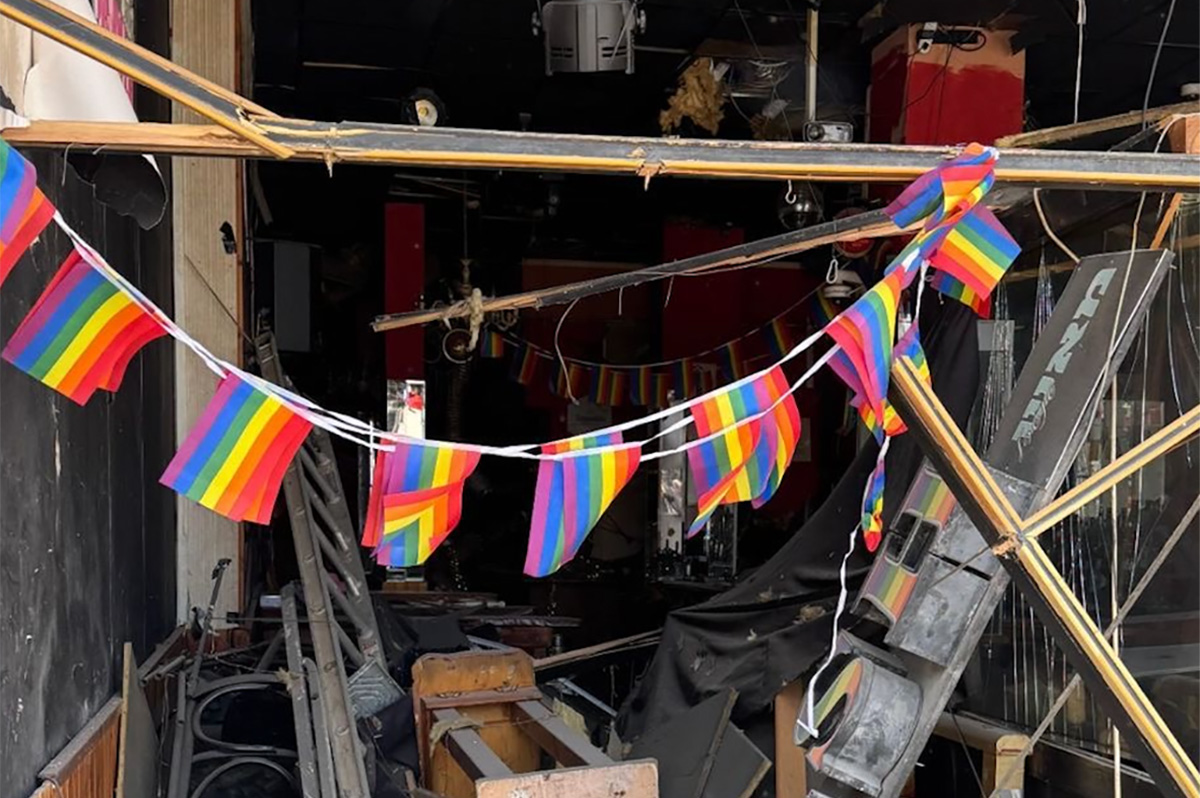
An Iranian missile on June 16 destroyed a gay bar in Tel Aviv, Israel.
The missile struck Mash Central, which is a few blocks from the U.S. Embassy on Allenby Street, and surrounding buildings. Israeli sources confirmed to the Washington Blade that Mash Central was the only gay-specific bar in Tel Aviv.
“Iran’s missile strike yesterday destroyed Tel Aviv’s only dedicated gay bar,” reads one Instagram post with pictures from inside the bar. “This place provided a safe space for minorities to express themselves — now it’s trashed.”
Mash Central describes itself as Tel Aviv’s “last gay bar standing,” even though the city promotes itself as one of the world’s most LGBTQ-friendly cities.
Israel on June 13 launched airstrikes against Iran that targeted the country’s nuclear and military facilities. Iran since the war began has launched hundreds of missiles towards Israel.
Tel Aviv’s Pride parade was scheduled to take place on June 13, but authorities cancelled it. Caitlyn Jenner, who was to have been the event’s guest of honor, is among those who were stranded in Israel after the war began.
Israel
Tel Aviv Pride parade cancelled after Israel attacks Iran
Caitlyn Jenner was to have been guest of honor
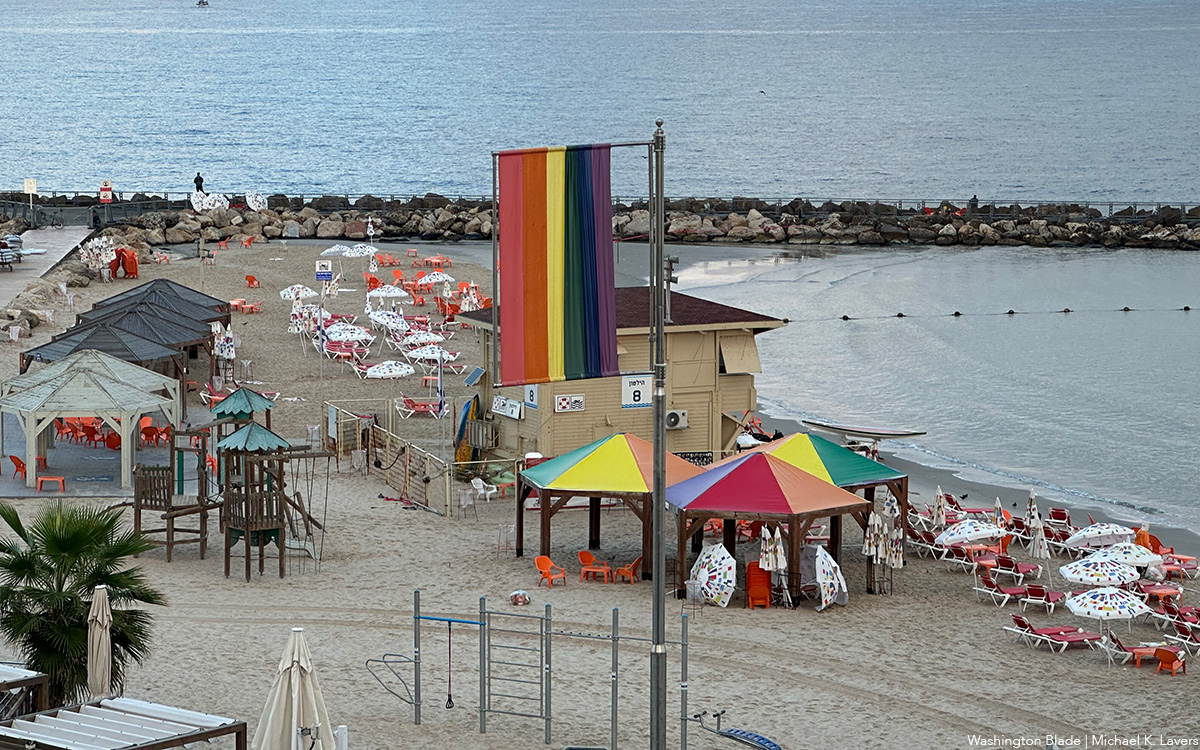
Tel Aviv authorities on Friday cancelled the city’s Pride parade after Israel launched airstrikes against Iran.
The Associated Press notes the Israeli airstrikes targeted nuclear and military facilities in Iran. Reports indicate the airstrikes killed two top nuclear scientists and the leader of Iran’s Revolutionary Guard.
Iran in response to the airstrikes launched more than 100 drones towards Israel. The Israel Defense Forces said it intercepted them.
The Tel Aviv Pride parade had been scheduled to take place on Friday. Caitlyn Jenner was to have been the event’s guest of honor.
Authorities, in consultation with local LGBTQ activists, last year cancelled the Tel Aviv Pride parade out of respect for the hostages who remained in the Gaza Strip after Oct. 7. Jerusalem’s annual Pride parade took place on June 5.
Iran
Underground queer network challenges Iranian regime
Homosexuality remains punishable by death in country

While global powers negotiate with Iran’s regime under Ayatollah Ali Khamenei to curb its advancing nuclear program, the oppressed LGBTQ community is building and operating a secret underground network to resist state-coerced sex reassignment surgeries.
These surgeries, mandated for gay and lesbian people as a state-sanctioned alternative to execution for homosexuality, are part of Iran’s penal code that criminalizes consensual same-sex sexual relations. The network provides safe houses, forged identification documents, and covert communication channels to protect members from government raids and imprisonment.
Precise data on LGBTQ people prosecuted in Iran for resisting state-coerced sex reassignment surgeries over the past decade remains elusive, as the regime’s opaque judicial system obscures such cases under vague charges like “corruption on earth” or “sodomy.” NGOs, including 6Rang, report that thousands of gay and lesbian Iranians face pressure to undergo surgeries to avoid execution for same-sex conduct, with resistance often leading to arrests or harassment for violating gender norms.
Zahra Seddiqi Hamedani and Elham Choubdar, two prominent activists, in 2022 were sentenced to death for their social media advocacy, charged with “corruption” and “human trafficking,” though their convictions were overturned in 2023. Similarly, Rezvaneh Mohammadi in 2019 received a five-year sentence for promoting “homosexual relations,” a charge hinting at resistance to the regime’s heteronormative mandates.
Arsham Parsi in 2003 escalated his clandestine fight for Iran’s LGBTQ community by launching Voice Celebration, a secret Yahoo chat group where 50 queer Iranians, using aliases, exchanged coded messages to evade the regime’s surveillance. Operating like operatives in a shadow network, participants shared text messages about human rights and survival tactics, knowing a single breach could lead to torture or execution. Parsi, then 23, orchestrated the group’s encrypted communications, building a virtual lifeline that connected isolated individuals across the country until his cover was nearly blown, forcing a desperate escape in early 2005.
Parsi in an exchange with the Washington Blade revealed a defiant undercurrent in Iran, a movement too elusive to be called traditional resistance yet pulsing with covert rebellion against the regime.
The state’s relentless push to force gay men into coerced surgeries — marketed as a “solution” to their sexuality — seeks to erase their identities through enforced conformity. Parsi, steering the International Railroad for Queer Refugees, disclosed how queer Iranians fight back with clandestine measures: Underground education to counter state propaganda, discreet psychological support to fortify resilience, and encrypted networks to forge secret alliances. These efforts, veiled to evade regime detection, dismantle the state’s narrative with every hidden signal and guarded connection.
“We are working to create a true grassroots resistance by empowering people to understand their identity, seek safe alternatives, and reclaim their agency despite the oppressive context,” said Parsi. “The Iranian regime’s policies are built on denial of sexual orientation and a forced alignment with a binary gender model.”
“Rather than recognizing gay, lesbian, or bisexual individuals, the system pressures them — particularly gay men — to undergo irreversible surgeries in order to be legally tolerated,” he added. “This systemic violence creates deep psychological harm and compels many to resist, even quietly, to protect their truth. The lack of legal recognition and the threat of arrest, harassment, or blackmail fuels the underground defiance we see today. It’s not only resistance for survival — it’s a rejection of state-imposed identity suppression.”
IRQR, guided by Parsi, for nearly two decades has operated as a lifeline, orchestrating daring escapes and running a covert network for Iran’s hunted queer community.
Parsi said his work relies on secret, encrypted channels — meticulously managed to avoid detection — to funnel at-risk individuals to safety, smuggle life-saving information, secure hidden safe houses, and deliver emotional support. Every operation faces threats not only from the regime’s security forces but also from Basij militia operatives who masquerade as queer individuals to infiltrate networks, heightening the peril for those marked by their identities.
Black-clad Basij militia members respond at the first signs of defiance; tearing through crowds on motorcycles with batons and guns at the ready, poised to crush any challenge to Iran’s regime. These paramilitary volunteers, bound by fierce loyalty to the Islamic Republic, serve as the state’s enforcers, their plainclothes operatives slipping into dissident networks to root out the defiant.
The Basij fill queer Iranians with dread; their so-called morality patrols and digital traps stalking those who dare to exist outside the regime’s rigid norms.
“Their goal is not only to gather intelligence but to undermine, divide, and cancel the work of activists and organizations like ours,” said Parsi. “This divide-and-conquer strategy is designed to break solidarity and generate mistrust.”
“We have seen numerous cases where trusted circles were compromised by these informants, and it has made our work — and survival — even more complex,” he further noted. “Despite this, we persist. Through our underground connections, we have helped thousands of queer Iranians seek safety, community, and ultimately, freedom.”
Parsi told the Blade that international support — through funding, advocacy, policy pressure, or amplifying his stories — can significantly strengthen his work to protect Iran’s persecuted queer community. He emphasized IRQR operates with limited resources, making global solidarity essential to improve outreach, enhance safety measures, and respond swiftly to those in need. Parsi underscored such support brings visibility to the crisis in Iran, reminding those at risk they are not forgotten while exerting pressure on a regime that thrives on silence and fear.
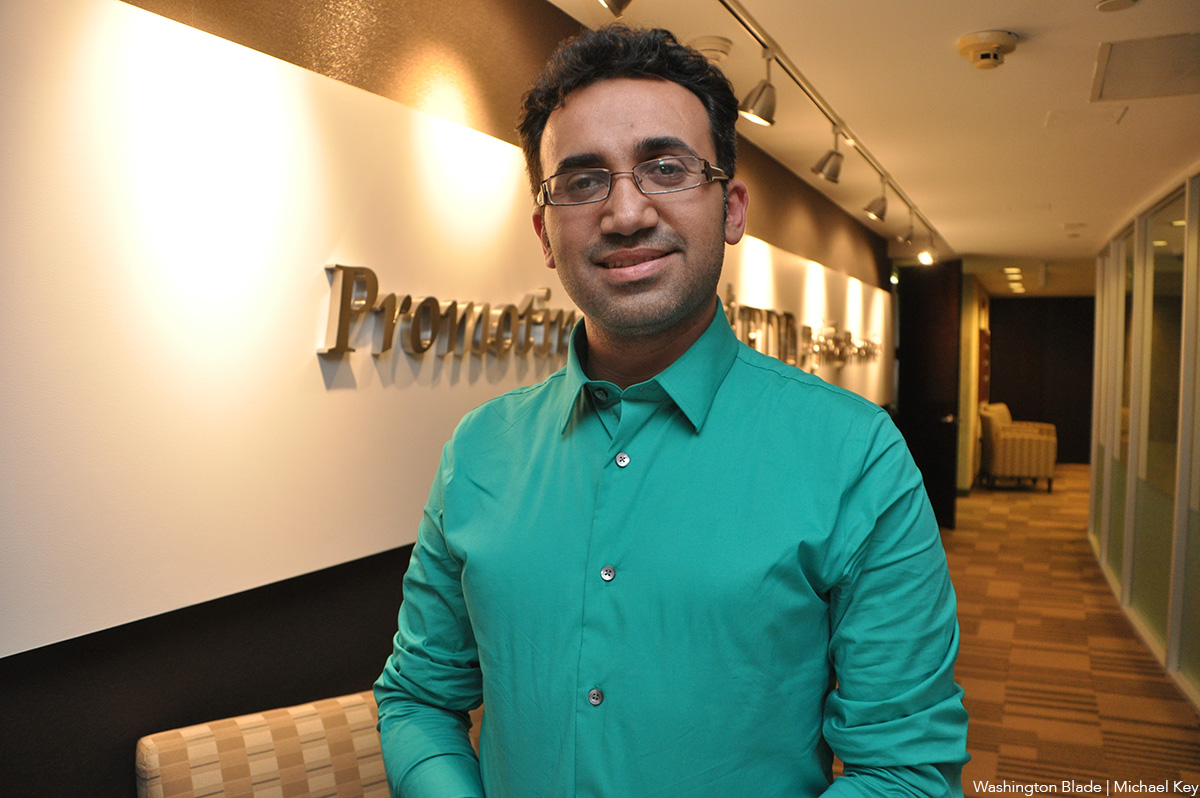
One of the things that Parsi’s underground network offers is online workshops that educate queer Iranians about how they can remain beyond the regime’s reach.
He said these sessions, designed for safety and accessibility, encompass peer support, mental health education, digital security training, and guidance on refugee pathways. Parsi explained the workshops give vulnerable Iranians the tools to navigate persecution, defy state surveillance, and pursue escape, exposing the resilience of a community under relentless scrutiny.
“Due to the high risk of persecution in Iran, traditional protests are not feasible,” said Parsi. “Instead, acts of resistance take quieter forms — like anonymous storytelling which are just as powerful in building awareness and connection within the community. While discreet, these activities help create a sense of solidarity and empowerment among queer Iranians.”
Parsi, undeterred by Iran’s unyielding regime, asserted with measured confidence that while underground acts of defiance — living authentically, supporting one another, resisting forced medicalisation — may not shift policy overnight, they are already improving lives. He stressed these quiet rebellions that queer Iranians stage challenge the regime’s narrative of shame and invisibility, forging a resilient foundation for future change. Each act, Parsi emphasized, dismantles the regime’s grip, offering hope to those navigating a landscape of relentless oppression.
“At IRQR, we view each life saved, each network built, and each truth spoken as a small but powerful act of resistance,” said Parsi. “These are the seeds of future liberation. Over time, as they multiply and gain visibility — locally and internationally — they will help reshape the landscape for queer Iranians.”
ILGA Asia Executive Director Henry Koh said queer Iranians’ underground resistance is a powerful assertion of bodily autonomy and self-determination. He described it as a deeply courageous act in a regime where visibility invites immense personal risk, from arrest to execution.
When asked by the Blade if the Iranian regime’s punitive measures against openly queer people fuel underground resistance, Koh responded unequivocally.
“Absolutely,” he said. “The climate of criminalization and repression leaves little safe space for queer people to live openly. This forces many into secrecy or underground networks as a means of survival, resistance, and mutual support. Such conditions are not only unjust but also profoundly harmful to the well-being of LGBTIQ+ individuals.”
“It is important to distinguish between affirming gender-affirming care and any form of coercive medical intervention,” he added. “When states or authorities mandate medical procedures as a condition for recognition or safety, it constitutes a grave violation of human rights. Gender identity is deeply personal, and no institution should override an individual’s self-defined identity.”
-

 U.S. Supreme Court3 days ago
U.S. Supreme Court3 days agoSupreme Court upholds ACA rule that makes PrEP, other preventative care free
-

 U.S. Supreme Court3 days ago
U.S. Supreme Court3 days agoSupreme Court rules parents must have option to opt children out of LGBTQ-specific lessons
-

 India5 days ago
India5 days agoIndian court rules a transgender woman is a woman
-

 National5 days ago
National5 days agoEvan Wolfson on the 10-year legacy of marriage equality

